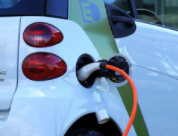New Hampshire regulators approve new EV charging rates for Unitil, Liberty and cut demand charges in half
The New Hampshire Public Utilities Commission on Thursday approved new electric vehicle charging time-of-use rates for Unitil and Liberty Utilities, and directed Eversource Energy to file similar rates after the utility's managed charging proposal was rejected.
The order sets peak, mid-peak, and off-peak rates, and was approved as part of a settlement that also cut in half the demand charges that would apply to public stations. Despite the reduction, EV advocates appear split on whether public charging station accessibility will grow under the new rates.
New Hampshire joins more than two dozen other states that have taken action to mitigate demand charges, according to Justin Wilson, director of public policy at ChargePoint. Particularly for new stations that may have low utilization rates, "any relief on the demand charges is very welcoming," he said.
There are large swaths of New Hampshire with no direct current fast-charging stations, according to Clean Energy NH Executive Director Sam Evans-Brown. "The landscape is quite sad," he said, and the new commercial rates approved last week appear unlikely to help -- even with lower demand charge.
"This new charge is not going to create an environment in which there will be an incentive to invest in public charging," Evans-Brown said.
Utilities have 90 days to develop and implement the rates, he said. Liberty has an existing electric vehicle charging rate for residential customers and will only be implementing new commercial rates.
The issue of demand charges has been understood for years. The charges are based on a station's peak use, and are designed to account for local costs necessary to serve that customer. Stations with low utilization pass those costs on to just a few customers. An RMI study in 2017 concluded that demand charges often left public stations unable to turn a profit, as they can be responsible for 90% of a station's electricity costs.
Clean Energy NH was a party to the proceeding but did not join in the settlement due to the demand charges.
"New Hampshire is well behind the rest of New England in building this infrastructure. And so this demand charge proposal, I'm fairly confident in saying that it is not going to result in New Hampshire catching up to the surrounding region," Evans-Brown said. He pointed out that some states have adopted "demand charge holidays" for charging stations, dropping the charges for up to a decade.
ChargePoint, which runs a public network and already has stations in New Hampshire, says the settlement is likely an incremental improvement for customers and should be considered a starting point for future development. The issue of demand charges won't go away until utilization rates climb, said Wilson. And that is something utilities and regulators must keep in mind, in particular as funds from the 2021 federal bipartisan infrastructure bill are used to build out a national charging network.
"Those stations might in the early days have low utilization," Wilson said. "Making sure that utility rates make it accessible for EV drivers is super important. So I would encourage ... other states in New England and across the country to take a look at the utility targets, and make sure that they're aligned with the business operations of the charging station."
Due to issues with Eversource's metering infrastructure, regulators required the utility to adopt a two-period time-varying rate for residential customers and to adopt a manually-billed three-period TOU rate consistent with the settlement methodology for commercial customers.
"We also require Eversource to develop an alternative metering pilot proposal that will utilize metering embedded in chargers and vehicles for the purpose of offering time varying rates," regulators said.
The utility did not respond to a request for comment.
– Robert Walton @TeamWetDog

